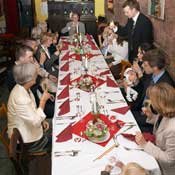Wednesday, May 11, 2011
When Beth Kander moved to Jackson in 2003, she hardly knew anyone. Kander, an author and playwright who has also written for the Jackson Free Press, was far from her family in the Midwest and her college friends in the Northeast.
About five years ago, Kander decided to host an "Urban Family Thanksgiving" for her friends in Jackson—not a replacement for the holiday she would spend with her own family but a new tradition. "I wanted to acknowledge and celebrate the fact that the friends and community we have here really do become our family," Kander says.
The event was a hit, and she has made it an annual occurrence. Kander's insight—that city-dwelling adults without families of their own can use networks of friends as a surrogate family—is well supported by sociological and other research.
Sociologist Claude Fischer has documented how the social networks of city-dwellers rely more on friends and coworkers than the kin-heavy groups in rural areas. And medical research by epidemiologist Lisa Berkman, among others, has shown that the health benefits that come from having strong social ties are just as attainable through friendships as through families.
But how to cement those bonds? The following are some thoughts what makes an urban family event a success.
Tradition: An urban family shares old traditions while forging new ones. "That's the dynamic: being able to share what's been important to you and being open to the new traditions that you're creating with your urban family," Kander says.
Food: There's a reason so many holidays and family memories revolve around food. Breaking bread together is an easy demonstration of community.
Collaboration: When people come together for a project, something as simple as a meal, they trust one another to contribute their part.
Expectations: An urban-family gathering is different from a party, because everyone involved knows they're there to build community.
